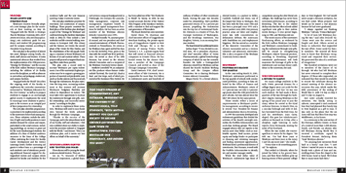Trustees, Board Adopts New Strategic Plan
 Wesleyan’s trustees formally adopted a new strategic plan for the university at their meeting on May 20. “Engaged with the World: A Strategic Plan for Wesleyan University, 2005?2010” (www.wesleyan.edu/wesleyanplanning/) sets ambitious goals for academic and student life programming and for campus renewal, according to President Doug Bennet.
Wesleyan’s trustees formally adopted a new strategic plan for the university at their meeting on May 20. “Engaged with the World: A Strategic Plan for Wesleyan University, 2005?2010” (www.wesleyan.edu/wesleyanplanning/) sets ambitious goals for academic and student life programming and for campus renewal, according to President Doug Bennet.
The new plan is the product of almost two years’ dialogue among faculty, students, staff, alumni and trustees. It notes institutional advances that resulted from the implementation of its 1998 precursor, “Strategy for Wesleyan,” and the success of the $281 million Wesleyan Campaign, including the addition of 20 faculty across the disciplines, as well as advances in curriculum and pedagogy, student aid, and campus facilities.
“Engaged with the World” describes the ongoing work of the faculty to implement the curricular innovations envisioned in “Wesleyan Education for the 21st Century,” as well as to prepare students to engage in an increasingly global society. It emphasizes the need to encourage more students to participate in the sciences as an integral part of their preparation for citizenship.
The new plan identifies programmatic priorities to be implemented according to the university’s future fund-raising success. These initiatives include the addition of eight new faculty positions to meet student demand for courses and majors, particularly in the social sciences, including psychology; an increase in grant aid for the most disadvantaged students; the addition of a dean of student academic resources to the Dean of the College Office; endowing the Center for Faculty Career Development and the Service Learning Center; further increasing aid grants to reduce loans as a percentage of each student’s cost of attendance; providing additional financial support for distinguished visitors and campus events planned by faculty and students for the residence halls and the new Suzanne Lemberg Usdan University Center.
The new plan establishes priorities for renovation and construction of campus buildings. These projects constitute the third phase of the facilities plan developed as part of the “Strategy for Wesleyan” and confirmed during the Facilities Masterplan study in 2002?03. They include a new molecular and life sciences building; renovations to Davenport Hall, Olin Library and the Davison Art Center; the second phase of the Center for Film Studies, and the rehabilitation of the old squash building as a museum to house Wesleyan’s collections of art and material culture. These projects will proceed as targeted fund-raising efforts make them possible.
The plan cites a crucial need to increase Wesleyan’s per capita endowment. One of the university’s highest priorities must be to support a growing proportion of essential and predictable costs (such as faculty salaries and financial aid) through the endowment, the plan states. Over the long term, increasing endowment in this manner will increase Wesleyan’s budgetary flexibility and reduce its dependence on tuition. “We must take every opportunity to increase the endowment through new gifts, careful stewardship, and successful investments,” according to the plan.
In order to implement these initiatives, Wesleyan will need to raise funds even beyond the levels achieved through the Wesleyan Campaign.
“Thanks to the success of the Campaign and to the extraordinary work of our faculty, staff and volunteers, I feel very confident about our ability to implement the priorities outlined in ?Engaged with the World,’” said Bennet. “This is an ambitious plan, and it merits our best efforts on behalf of the university.”
